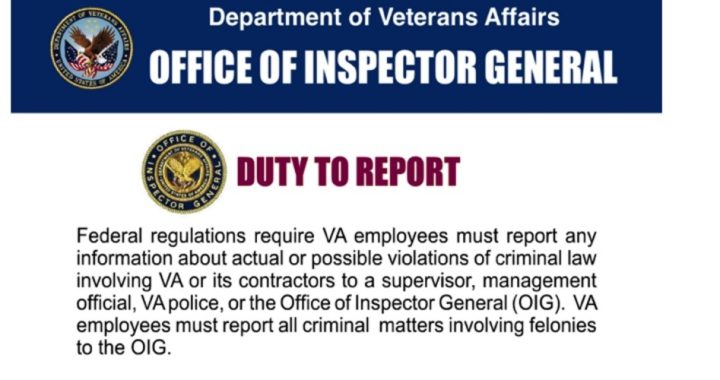
Despite intense scrutiny following the Veterans Affairs wait-time scandal that was exposed two years ago, an investigation by the Department of Veterans Affairs Inspector General reveals not much has changed at the VA. The investigation uncovered evidence of fraud and regulatory violations related to scheduling issues at 51 VA medical facilities, USA Today reports, but despite the findings, no corrective action has been recommended. Unfortunately, that information is just about the extent of what has been revealed from the investigation. According to USA Today, the investigation, which reviewed 73 medical facilities, was completed in December, yet months later, no reports have been publicly released.
“As a result, it’s impossible to tell which medical centers had problems, how serious those problems were, or whether they led to the deaths of any veterans,” USA Today writes. The most that the inspector general revealed was that the violations vary from minor to deliberate fraud.
USA Today filed a Freedom of Information Act request following repeated inquiries that have gone unanswered, prompting the inspector general’s office to state that it will release the reports “shortly.”
USA Today also notes that IG spokeswoman Catherine Gromek attempted to defend the delay by suggesting that the office did not want to disrupt possible disciplinary action by the VA, but numerous instances of violations received no discipline.
Meanwhile, President Obama signed legislation in December that mandated the VA inspector general’s office had to release results of investigative reports within three days of completion.
Gromek contends that the legislation only applies to specific types of reports that include recommendations based on the findings of the investigation. “The reports of (wait-time) investigation are not issued and do not make a recommendation or suggest a corrective action,” she said. “We transfer our findings to VA’s Office of
In other words, by failing to do its job and not make recommendations, the IG is exempt from the requirement set forth by the law.
USA Today was able to learn that one location at which improper scheduling took place was a facility in Wilmington, Delaware, provoking anger from Democratic Representative
Secrecy appears to be a continuous problem at the VA. Former interim Inspector General Richard Griffin stepped down from his position in July after being criticized for secrecy, for example. Griffin came under fire over investigation reports he released that did not conclude falsified wait times led to patient deaths, and for closing nearly 150 investigations without issuing public reports.
USA Today writes,
In one case, the inspector general failed to release a report about potentially dangerous prescriptions being doled out at a VA hospital in Wisconsin in 2014. VA officials didn’t fix the problem, and five months after the report was completed, veteran Marine Jason Simcakoski, 35, died from a fatal mixture of drugs prescribed at the hospital. The VA didn’t correct the prescribing practices until his death became public last year.
Since 2014, the Veterans Administration has been under harsh scrutiny after reports exposed that the Phoenix facility had been altering its scheduling books and that at least 40 veterans had died while awaiting care. Reports later revealed similar issues with lengthy waiting times in at least 10 states.
An April 2015 report entitled “Analysis of Death Services” provided startling insight into the devastating effects of VA’s mismanagement. The report showed that there were 847,822 veterans pending enrollment in VA healthcare, and that of those veterans, 238,657 were already deceased. Additional reports revealed that even after whistleblowers brought these major issues to the attention of officials at the VA, nothing was done.
On Thursday, a report from the Office of Special Counsel revealed that the VA IG “failed to adequately investigate whistleblower disclosures about veterans’ access to dental healthcare.” The report is based on testimony from two Department of Veterans Affairs employees at the Edward Hines, Jr., VA Hospital in Chicago, Illinois, and the Overton Brooks VA Medical Center in Shreveport, Louisiana — Germaine Clarno, a social worker at Hines, and Christopher Shea Wilkes, a social worker at Overton Brooks.
The Office of Special Counsel outlined its findings in a letter to President Obama. It indicates that Clarno and Wilkes claim that supervisors directed employees at their facilities to violate VA scheduling protocols, which created the false impression of reasonable wait times.
The Office referred the allegations levied by Clarno and Wilkes to the VA for investigation, as the law states the VA is required to investigate such allegations and report back to the OSC on its findings. But according to the OSC, the VA did not conduct a full investigation. The letter elaborates,
The OIG investigations that the VA submitted in response to both referrals are incomplete. They do not respond to the issues that the whistleblowers raised. The OIG investigations found evidence to support the whistleblowers’ allegations that employees were using separate spreadsheets outside of the VA’s electronic scheduling and patient records systems. However, the OIG largely limited its review to determining whether these separate spreadsheets were “secret.”
The OIG ultimately concluded that there remains a need for “a broader review of access to care challenges at the hospitals” based on its review of the allegations.
Previous reports also revealed that those who dared to blow the whistle on the problem reportedly suffered retribution. Special Counsel Carolyn Lerner confirmed as much in her testimony during a House Veterans Affairs subcommittee hearing in April 2015, reported The Blaze.
According to Lerner, many of the whistleblowers are veterans themselves, who have been seeking care at the VA. “In several cases, the medical records of whistleblowers have been accessed and information in those records has apparently been used to attempt to discredit the whistleblowers,” she said, adding, “We will aggressively pursue relief for whistleblowers in these and other cases where the facts and circumstances support corrective action.”




